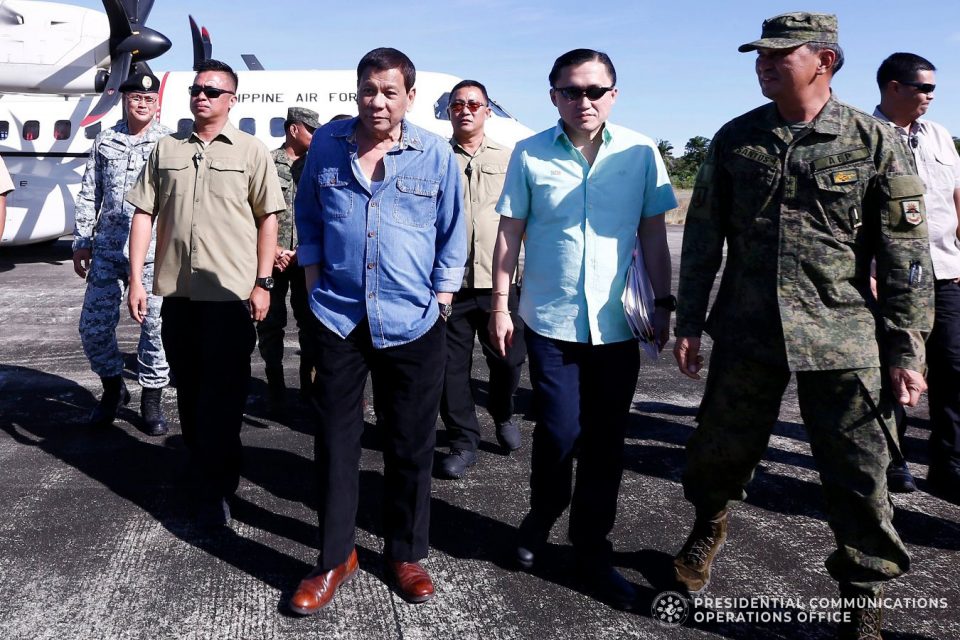
President Rodrigo Roa Duterte at the Philippine Rise Commemoration 2018
President Rodrigo Roa Duterte is accompanied by Sec. Bong Go of the Office of the Special Assistant to the President and 7th Infantry Division Commander Major General Felimon Santos Jr. upon the President’s arrival at the Casiguran Airport in Aurora before they head to Casiguran Sound on board BRP Davao del Sur for the Philippine Rise Commemoration on May 15, 2018. ALFRED FRIAS/PRESIDENTIAL PHOTO
(Eagle News) — President Duterte said there was no point in “declaring war” against China over its militarization in disputed areas in the West Philippine Sea, even as he said he had told China’s President Xi Jinping that he would be still be asserting the arbitral ruling that the Philippines won.
“There was this arbitral ruling because of the conflicting claimants. You must remember that it’s not only China — in reality, not China and Philippines, but actually it involves so many countries: Taiwan, Philippines, Vietnamese and Malaysia for that matter,” the President said earlier.
“When China claimed the entire ocean as theirs, eh wala akong magawa, wala tayong magawa eh ‘yan ang gusto niya,” he said.
President Duterte recalled that in his first meeting with the Chinese president, brought out the issue of the arbitral ruling, saying he intended to enforce it.
“And suddenly I blurted that, ‘you know, Mr. President, we are claimants to that island and we have this arbitral award. Though I am not insisting on its solution now, I’d like you to know that I am going to China Sea to claim part of our territory and I will dig oil’,” Duterte said in his speech recalling what he told President Xi.
“I was that forward. Hindi lang ‘yung sinasabi mo na ‘pushing on’… Talagang sinabi ko harap-harapan in a bilateral, nandiyan kaming lahat,” he said saying his whole cabinet was there, including National Security Adviser General Hermogenes Esperon, General Eduardo Año, and Defense Secretary General Delfin Lorenzana.
“And you know what? Si Xi Jinping, the ever cool na guy started by just sabi niya, ‘Well, we just restored our relationships. I think it’s a new era for us, a new day and if I may beg you not to bring this up forcefully because there will be a time that we will be discussing it’,” Duterte recalled.
The President said declaring war against China would not solve anything and would only lead to needless deaths.
“I can declare war on China tonight. At sino ang magpunta? Sundalo ko? Pulis ako? Mamatay lang lahat ‘yan,” President Duterte said.
“Why will I go to war for a battle that I cannot win?” he added.
The President said he would discuss geopolitics some other time and explain why he allowed things to just “stay there.”
“There is an airport. There are missiles there installed. There are military equipment already in place,” he said when asked about his statement on the reports that China has landed some of its air assets in some of the areas.
-Hague ruling still to be enforced-
“So what’s the point of questioning whether their planes land or not? There’s an airstrip,” he added.
The President still reassured the Filipinos that he would insist on The Hague ruling during his term.
He recalled what he told President Xi.
“And sabi ko, ‘right, Mr. President, at least during my term I will raise the issue again.’ Pero nagpipilit ako sabi ko those — “whatever is in the bowels the Earth is ours over there because that is our territory.”
-White House warns consequences for China-
The White House warned last week that China would face “consequences” for its military buildup in contested waters in the western Pacific.
“We’re well aware of China’s militarization of the South China Sea,” said press secretary Sarah Sanders.
“We’ve raised concerns directly with the Chinese about this and there will be near-term and long-term consequences.”
Sanders did not say what the consequences would be.
The South China Sea — which sits between Vietnam, the Philippines, China and several other countries — is subject to a myriad of competing territorial claims.
But in recent years China has upped the ante, seizing islets and atolls in the face of protests and bellicose warnings.
Beijing had reasserted its right to build “defense” facilities in the disputed region, but declined to confirm reports it had installed new missiles on artificial islands it had built.
Beijing sees the area as key to pushing its defenses beyond China’s coast and securing oil supply routes.
Washington and other western countries have insisted that disputes must be settled legally and that freedom of navigation be respected.
(with a report from Agence France-Presse)








